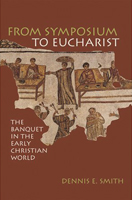Lord's Supper: Communion Means We're One, Right?
All of us share
In First Corinthians chapter 10, verses 16 and 17, the Apostle Paul asks, “Is not the cup of thanksgiving for which we give thanks a participation in the blood of Christ? And is not the bread that we break a participation in the body of Christ? Because there is one loaf, we, who are many, are one body, for we all partake of the  one loaf. Look at the word "participation" that comes up twice in this short passage. The Greek word that the NIV translates as “participation” is the word koinonia, which means sharing, fellowship, participation, communion.
one loaf. Look at the word "participation" that comes up twice in this short passage. The Greek word that the NIV translates as “participation” is the word koinonia, which means sharing, fellowship, participation, communion.
The description of the Lord's Supper as "communion" comes from this passage. To call the Lord’s Supper “communion” is to indicate a oneness. It signifies oneness with the Lord, certainly. But it also denotes oneness with each other. “We who are many,” Paul says, “are one body, for we all partake of the one loaf.”
Unity at the Last Supper
This theme of unity or oneness is central to the Lord’s Supper. That is quite clear when you look at the passages in the Gospels that report to us the dinner conversation around the table on the night it was instituted. The big theme of the evening was unity: developing a servant’s heart willing to wash feet; not lording it over your brothers and sisters, but finding ways to help and encourage them; learning what it takes to become one, united in love, one to such an extent that we even share in the oneness the Son has with the Father; and then coming to witness the awesome effect this oneness has on a world that is divided, splintered, fragmented, even schizophrenic.
Disunity in Corinth
When Paul spoke to the Corinthians about the Lord’s Supper (1 Corinthians 11:17-34), his central focus was unity. Some were going ahead and eating before the others arrived, so that when they finally did arrive, they had to go hungry. Others were actually so self-indulgent that they were using the wine to get drunk. Paul rebukes them, urging them to “discern the Body” which again and again in First Corinthians refers to the Christians themselves. In vv. 27-30, he warns that if they don't discern the Body, in other words, if they ignore or work against their oneness, they are eating and drinking themselves into damnation.
Is unity a problem for us?
So if unity was such an issue among the original apostles, and if it was a central concern with the Corinthian church, what about us? Is unity a problem for us? Is it?
Look around your church assembly. Is there someone you don’t know? Is there someone you avoid? Someone you look down on or hold a grudge against? We all know that’s not how it’s supposed to be, but is that how it is? Is it?
“We who are many, are one body, for we all share, participate in, have fellowship with, enjoy communion with the one loaf. We who are many, are one body, for we all participate in, share, have communion with the one cup. That’s what the Lord has in mind, but is that how it really is? Is it?
Covenant for oneness
Whether it is or not is up to each of us. By eating this bread and drinking this grape juice you are making a covenant that you want this oneness--oneness with the Lord and with each another. It is also a pledge: that you will do what it takes to make this oneness happen. If you don't agree, don't eat. If that is not your pledge, don't drink.
Look around you once more. These are people you have fellowship with. They are your brothers and sisters, your family. Each of us that is tied to the Lord is also tied in unity to one another. That’s the way it ought to be, but is it? Is it?
Want to go deeper?
Rather than unity on the night of the Last Supper, the disciples had a spirit of rivalry. Take a look at Luke 22:24-30, where Jesus has to tell them, "Stop acting like pagan rulers." Even Peter was not exempt from this attitude, for he said, "Even if everyone else denies you, I won't" (Matthew 26:33). That statement creates a rhetorical separation between him and the others. Of course, Judas Iscariot was acting independently and counter to what the rest intended (see John 13:21-30).
In the face of all of this jockeying for position and individualistic words and deeds, Jesus' words and deeds were designed to draw them together again. Study the significance of washing their feet (John 13:1-17), giving them an unforgettable common experience. It was doubly humbling in that they had to receive this service from their Master and they had avoided doing it themselves. In the "Farewell Discourse" (John 14 - 16), Jesus outlined their common mission, resources, and destiny. He concludes with his "High Priestly Prayer" (John 17), with unity as its central theme.
Recommended for purchase:
Dennis Smith.  From Symposium to Eucharist: Banquets in the Early Christian World (2002) – A survey of the importance of table fellowship from Plato to Paul, including an analysis of the relationship between the Lord's Supper and the agape meal.
From Symposium to Eucharist: Banquets in the Early Christian World (2002) – A survey of the importance of table fellowship from Plato to Paul, including an analysis of the relationship between the Lord's Supper and the agape meal.
Frank Carver. When Jesus Said Good-bye (1996) – Exposition of the Farewell Discourse (John 14-16).
Marcus Rainsford. Our Lord Prays for His Own (1985) – A verse-by-verse exposition of Christ's prayer in John 17.
As always, I don't necessarily recommend everything these books teach. Part of "going deeper" is developing your own spiritual discernment. It's good to "taste-test" before swallowing.
Steve Singleton, DeeperStudy.com
Labels: christian unity, communion, ecumenism, eucharist, lord's supper, sacrament
» Post a Comment